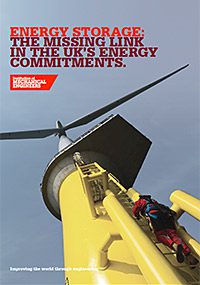
A debate hosted by the IMechE in Glasgow on 17 April brought together a panel of experts from the renewables and power engineering worlds to answer questions relating to the UK’s potential energy crisis, and how the country might proceed along a sustainable path in the future.
The panel comprised Professor Ian Arbon of sustainable engineering consultancy Engineered Solutions; Professor David Infield of the Institute of Energy and the Environment at the University of Strathclyde; Dr Hannah Chalmers, a lecturer in power plant engineering at the University of Edinburgh; Dr Steve Wyatt of Offshore Renewable Energy Catapult; and Bill Doig of Grove Consulting, who is also a previous acting station manager at Cockenzie Power Station.
Following a Question Time format, the evening kicked off with an audience member asking: “Is the UK government doing enough to go green?” Commenting on the efforts being made around the world, Infield remarked that, since CO2 emissions across the world were clearly accelerating, the conclusion had to be that “no, not enough is being done”.
“In the UK until recently, it looked like we were quite determined to reduce emissions”, he suggested. “But now it looks otherwise”. He went on: “We’re burning a lot of coal, and we’re expecting that on-shore wind will now have a tough time – and it has been making a strong contribution, whatever you think of wind.”
Doig said attempts to address the problem had to fight against the fact that “we live in a society where affordability of energy is very important”, which made it all too easy to relegate the problem – for many, at least – to the status of “let someone else deal with it”. He added: “If everyone was trying to do something, we would be in a strong position.”

The economics of energy
Wyatt remarked that for the last 3 or 4 years, “the Green agenda has been toxic, politically”. Looking at the question in terms of economics, we also have to face the fact that renewables are propped up by subsidies. He didn’t feel the government had been doing a bad job, in terms of things like the setting of feed-in tariffs, but the main problem at this stage is one of uncertainty for the manufacturing sector. “It’s the lack of a clear line of sight for private sector investors, that’s where the government could be doing more,” he said.
Internationally, the issue appears to be a massive challenge. “China and India don’t want to build their economies on expensive power, so the UK has an opportunity – or obligation – to do something.”
The panel agreed that the available energy efficiency measures were not having the impact that they should, with the smart metering rollout still faltering and the decision last year to delay the Green Deal, “the very measure designed to implement energy conservation at a domestic level”.
“It’s always cheaper to save energy than generating it anew”, said Infield, “but [ energy saving ] always seems to be down the list.” He shared a story from a colleague who had apparently attended a meeting with Alistair Darling, on the subject of energy policy, at which the latter had said something to the effect of “I could either make two new nuclear power stations, or try to persuade tens of millions of people to do something. Which do you think I’m going to do?”
Arbon concluded: “Energy efficiency is not sexy because it’s not economic, and the only language politicians understand is economics.”
There was some discussion as to how to address the baseload and despatchability problems with renewables, a situation Arbon characterised as “when the flexible meets the intermittent”. Doig spoke about the peaks and troughs of power generation, and the difficulties with matching supply and demand. The jitters suffered by grid managers when the commercial break for Coronation Street approached – in his memory – could only be magnified by the additional complexity of worrying about whether or not the wind is blowing or the sun shining.
He felt there was no easy answer. “It’s [ about ] management of the whole suite of generation – that’s the only way to handle it.” Wyatt said: “There’s a lot we can do to smooth out [ the ] peaks and troughs,” giving electric vehicles as an example (presumably because EV owners will be encouraged to plug their vehicles into the grid overnight).
There was regret at the UK’s laggard status when it comes to recovering heat from power generation and other processes. In Russia, entire towns are heated using the excess heat generated by nuclear power stations, said Doig. District heating works excellently in Denmark, said Arbon, where they manage to transport the excess heat from energy-from-waste plants. “It can be done – but someone has to pay for it.”
One cause for optimism, in Wyatt’s eyes, was the way the biomass industry is moving on in Scotland. “We’ve figured out how to configure these systems,” he said, adding that it’s now getting the attention of engineers, rather than just being an add-on service offered by plumbers.
Arbon plugged the IMechE’s new report (see image, above), which is apparently the first such document to look seriously at the storage of heat.
One audience member said he had been chatting to a guy in Aberdeen with a server farm generating 6MW of heat, situated a quarter of a mile from where the council was installing a swimming pool. He effectively phoned them up and said “you can have it for free”, but no one would pay for the quarter mile of pipe.
The lack of joined-up thinking is a problem, said Chalmers, who suggested that concepts like industrial ecology are going to become more important.
An expectant hush greeted the question: Would Scotland be better equipped for an energy efficient future as independent nation or as part of the UK?
“I do find a certain amount of humour in the way Alex Salmond presents some of his arguments,” began Doig, who lamented politicians’ preoccupation with annual usage, when the crucial matter is really ‘what’s the peak load demand?’
While it would be nice if England and Wales would act as the sink to keep Scotland free of spikes in energy production, this was probably optimistic. Although Scotland managed to generate over 40% of its energy from renewables last year, it was only because of this big balancing sink, said Wyatt.
Arbon agreed: “The incentives in Scotland are 90% funded by the rest of the UK. A factor that could change radically depending on September’s decision.”
In a discussion of the responsibility of the developed world to take the lead on renewables, Wyatt recalled a visit to China in recent years, where he had presented to an expert commission on climate change. “They were sceptical about whether the west was doing enough with respect to energy efficiency,” he said, “but they were willing to do something if the playing field was broadly level.”
Arbon got one of the biggest laughs of the night when he mentioned that China’s renewable energy target for 2020 is the same as ours. “The big difference: they might hit it.” Chalmers said that the developing nations like China do genuinely appear to “walk the walk” on these matters.







